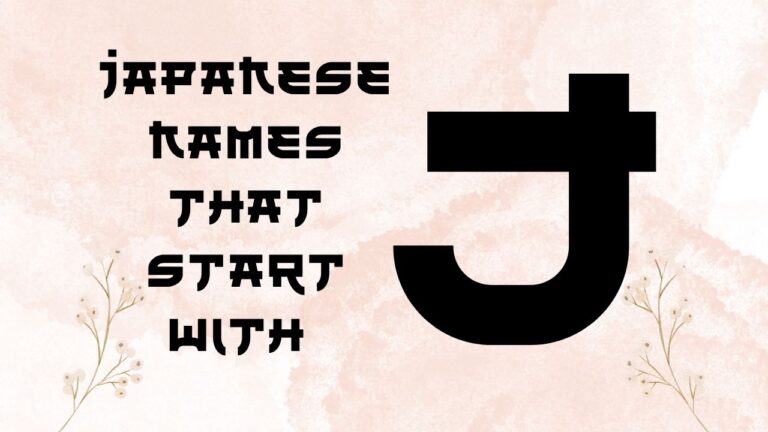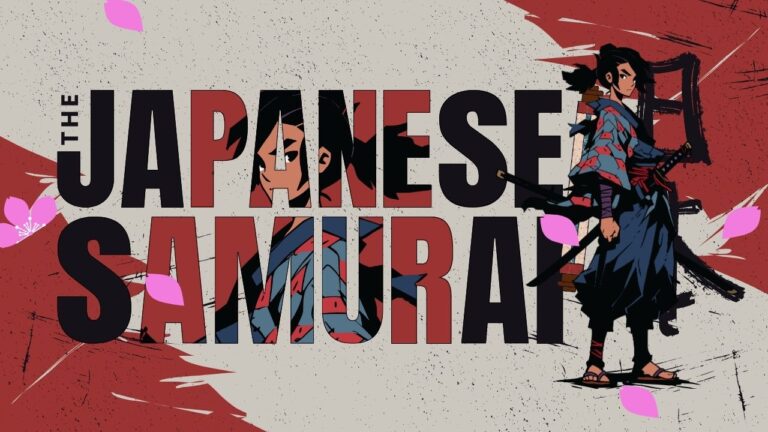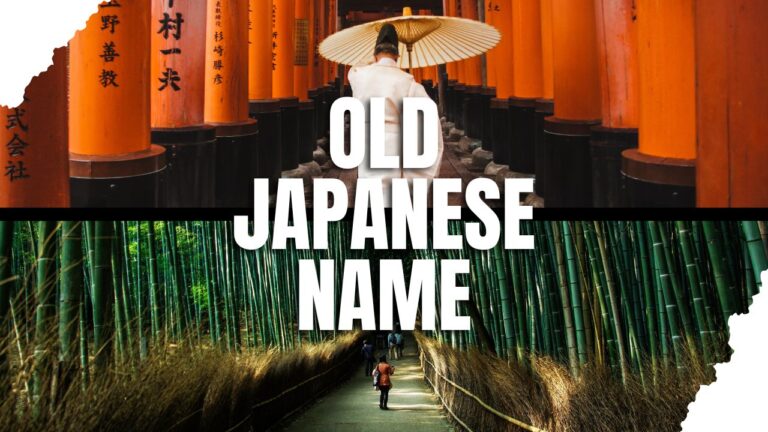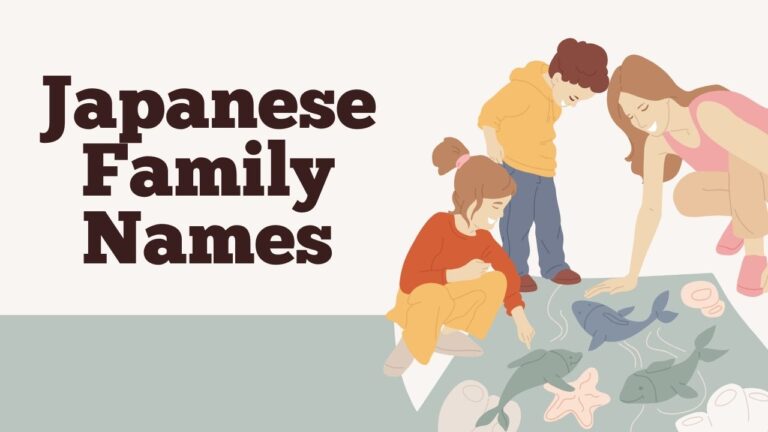150+ Japanese Names That Start With K – Girl, Boy & Unisex
Japanese names that start with K hold a special charm, offering meanings that are often inspired by nature, virtues, or beautiful imagery. Whether you’re searching for Japanese names that start with K girl, exploring options for boys, or looking into Japanese names that start with K unisex, this guide introduces a wide range of meaningful and culturally rich choices.
Many of these names are deeply rooted in tradition, while others stand out as modern and creative. If you’re drawn to something truly rare, you’ll also find unique Japanese names that start with K that reflect individuality and elegance. This article will help you discover the perfect name with ease and understanding.
Also Read:175+ Japanese Names That Start With M– Historical & Spiritual

female Japanese names that start with K
- Kaede (楓) – “Maple”
A nature-inspired name symbolizing beauty and the vibrant colors of autumn. - Kana (佳奈) – “Beautiful” + “Harmony”
A soft and gentle name often associated with kindness and grace. - Kiyomi (清美) – “Pure Beauty”
Represents inner beauty and clarity; popular for its poetic feel. - Kokoro (心) – “Heart” or “Mind”
A soulful name expressing deep emotions and sincerity. - Kyoko (京子) – “Child of the Capital”
Traditionally given to girls born in Kyoto or representing elegance. - Kasumi (霞) – “Mist”
A dreamy name linked to soft, ethereal beauty. - Kaho (花穂) – “Flower” + “Ear of Grain”
A fresh and blossoming name often linked to new beginnings. - Kanade (奏) – “To Play Music”
Ideal for families with a love for music and harmony. - Karin (花凛) – “Flower” + “Dignified”
Elegant and fragrant, often linked to the quince blossom. - Kumi (久美) – “Long Time” + “Beauty”
Reflects enduring charm and grace. - Kokona (心菜) – “Heart” + “Greens”
Modern name symbolizing a gentle, nurturing spirit. - Kanon (花音) – “Flower Sound”
Evokes the image of music and nature combined softly. - Kayo (佳代) – “Beautiful” + “Generation”
Often given to express hopes for a bright future. - Kimiko (君子) – “Noble Child”
A traditional name representing dignity and refinement. - Koharu (小春) – “Little Spring”
Refers to the early warm days in autumn, full of charm and warmth. - Kurea (紅愛) – “Crimson Love”
A unique, modern-sounding name symbolizing passion and affection. - Kyuri (桐里) – “Paulownia Tree” + “Village”
Rare and poetic, associated with natural elegance. - Kaori (香織) – “Fragrance” + “Weave”
A gentle and artistic name, often linked to beauty and creativity. - Kazusa (香澄) – “Fragrance” + “Clarity”
A refreshing and elegant name used in modern settings. - Kohana (小花) – “Little Flower”
Sweet and simple, symbolizing innocence and purity. - Kiku (菊) – “Chrysanthemum”
A classic flower name associated with nobility and longevity. - Konomi (好美) – “Favor” + “Beauty”
Represents likability and graceful charm. - Kazue (和恵) – “Harmony” + “Blessing”
Traditional and peaceful, often used in formal contexts. - Kirari (煌莉) – “Sparkle” + “Jasmine”
A shining, youthful name that feels light and cheerful. - Kisa (妃咲) – “Princess” + “Blossom”
Unique and noble, often chosen for its soft and regal tone.
male Japanese names that start with K
- Kaito (海翔) – “Ocean” + “Fly”
A modern and popular name symbolizing freedom and vastness. - Kenta (健太) – “Healthy” + “Big/Strong”
Commonly used to express physical strength and vitality. - Kazuya (一也) – “Harmony” + “Also”
A calm, balanced name often associated with peace and unity. - Keita (慶太) – “Blessing” + “Big”
Represents joy, success, and a prosperous future. - Kouki (光輝) – “Light” + “Radiance”
Reflects brightness, brilliance, and hope. - Kazuki (一樹) – “Harmony” + “Tree”
A gentle yet grounded name, symbolizing nature and balance. - Kenshin (剣心) – “Sword” + “Heart”
Linked to strength and honor; often heard in anime and history. - Kohei (康平) – “Peace” + “Flat/Calm”
Popular for its meaning related to health and tranquility. - Kyohei (恭平) – “Respectful” + “Peace”
Emphasizes humility and a peaceful nature. - Kanji (勘治) – “Perception” + “Govern”
Traditional name symbolizing wisdom and leadership. - Katsuro (勝郎) – “Victory” + “Son”
Strong and confident, often given to boys with high hopes. - Koshiro (孝志郎) – “Filial” + “Will” + “Son”
Old-fashioned but noble, reflects family values and strength. - Kazuma (一真) – “Harmony” + “Truth”
A popular name with a calm yet righteous meaning. - Kaoru (薫) – “Fragrance”
Unisex but often used for boys in traditional settings. - Kensuke (健介) – “Healthy” + “Assist”
Represents a reliable and supportive personality. - Kaito (魁翔) – “Pioneer” + “Fly”
Different kanji from the more common version; implies leadership. - Kouhei (浩平) – “Vast” + “Peace”
A broader version of Kohei, symbolizing deep calm. - Kazunari (和成) – “Harmony” + “Achievement”
Used to show balanced success and personal growth. - Kichiro (吉郎) – “Good Luck” + “Son”
Traditional name tied to fortune and blessings. - Kohaku (琥珀) – “Amber”
Rare for boys, poetic and rich in cultural depth. - Kaname (要) – “Pivot” or “Vital Point”
Strong and central, used for someone essential. - Kyouji (恭司) – “Respectful” + “Rule”
Indicates discipline and dignity. - Keisuke (圭介) – “Jewel” + “Help”
Often associated with intelligent and helpful men. - Kyojiro (京次郎) – “Capital” + “Next Son”
Historically used, especially in noble families. - Kakeru (翔) – “Fly” or “Soar”
Short and modern, symbolizing aspirations and dreams.
unisex Japanese names that start with K
- Koharu (心春) – “Heart” + “Spring”
A warm and gentle name symbolizing a new beginning. - Kaname (要) – “Essence” or “Vital Point”
A meaningful name that conveys importance and core strength. - Kaoru (馨) – “Fragrance”
A soft, elegant name used for both genders, evoking calmness. - Kanon (果音) – “Fruit” + “Sound”
A modern name tied to music, creativity, and natural growth. - Kokoa (心愛) – “Heart” + “Love”
A very modern and affectionate name, often chosen for its cuteness. - Koma (駒) – “Pony” or “Chess Piece”
A rare and stylish name, traditional yet adaptable. - Kirika (桐花) – “Paulownia Flower”
Nature-inspired and poetic, works well for any gender. - Kureha (紅葉) – “Crimson Leaves”
A unique name with autumn imagery and beauty. - Kazune (和音) – “Harmonious Sound”
Musical and peaceful, symbolizing unity and rhythm. - Kokona (心菜) – “Heart” + “Vegetable/Greens”
Fresh and soft, often used for gentle and nurturing characters. - Kisa (希咲) – “Hope” + “Blossom”
Hopeful and bright, reflecting gentle optimism. - Kirari (煌り) – “Sparkle” or “Shine”
Short and bright, suitable for someone who stands out. - Kiri (霧) – “Fog” or “Mist”
Mystical and neutral, often used in poetic contexts. - Kiku (菊) – “Chrysanthemum”
A flower name linked to beauty and traditional grace. - Kinu (絹) – “Silk”
Symbolizes smoothness, elegance, and refinement. - Koume (小梅) – “Little Plum”
Charming and classic, often chosen for its gentle sound. - Kanon (香音) – “Fragrance” + “Sound”
A variant spelling of Kanon, evoking peace and beauty. - Kairi (海里) – “Ocean Village”
Modern and unisex, often used in anime and pop culture. - Kiyo (清) – “Purity”
Simple, clean, and gender-neutral in traditional settings. - Kohana (湖花) – “Lake” + “Flower”
Delicate and reflective, suited for tranquil personalities. - Kazuho (和穂) – “Harmony” + “Ear of Grain”
Gentle and elegant, symbolizing unity and prosperity. - Kaho (歌歩) – “Song” + “Step”
Creative and rhythmic, a lovely choice for any gender. - Kazane (風音) – “Wind Sound”
A lyrical name that blends nature and music beautifully. - Kikuo (喜久雄) – “Joy” + “Long Time” + “Hero”
More masculine traditionally, but also used in unisex fashion. - Kiyora (清良) – “Pure” + “Good”
A modern name conveying goodness and clarity for any gender.
popular Japanese names that start with K
- Kazuki (和希) – “Harmony” + “Hope”
A balanced and hopeful name, popular among boys. - Kanna (神奈) – “Divine” + “Harmony”
A feminine name linked to purity and peace. - Kaito (快翔) – “Pleasant” + “Soar”
Another variation of Kaito, emphasizing cheerfulness. - Kanon (花乃音) – “Flower” + “Sound”
A stylish name among girls, associated with music and grace. - Kazuhiro (和宏) – “Harmony” + “Vast”
A strong and dignified name often seen in leadership roles. - Koharu (陽春) – “Warm Spring”
A poetic name used for girls, evoking renewal and light. - Kaoru (薫) – “Fragrance”
Timeless and gender-neutral, still frequently chosen today. - Kanato (奏翔) – “Play Music” + “Soar”
Modern and popular for its gentle yet bold sound. - Kento (健翔) – “Healthy” + “Soar”
Common for boys; implies strength and success. - Konomi (好実) – “Affection” + “Truth”
A sweet name often used for girls, meaning sincerity. - Keigo (敬悟) – “Respect” + “Enlightenment”
A respectful and intellectual name, used across generations. - Kotone (琴音) – “Harp Sound”
Very popular among girls; soft, musical, and elegant. - Kyoya (京也) – “Capital” + “Also”
Trendy and strong, often used in modern media. - Kanon (奏音) – “Play Music” + “Sound”
A frequently chosen name with a musical, serene feeling. - Kohaku (琥珀) – “Amber”
Gender-neutral and increasingly popular in recent years. - Kenta (拳太) – “Fist” + “Big”
Used for boys, implying physical strength and confidence. - Kokomi (心美) – “Heart” + “Beauty”
A soft, pretty name that’s rising in popularity for girls. - Kouya (航也) – “Navigate” + “Also”
Popular among boys; linked to journey and growth. - Kazuha (一葉) – “One” + “Leaf”
Simple and poetic, often used for girls. - Kiria (希莉愛) – “Hope” + “Jasmine” + “Love”
A rare yet fashionable name for girls, filled with positivity. - Kenshiro (剣士郎) – “Sword” + “Warrior” + “Son”
A strong, masculine name often seen in anime and manga. - Kohana (心華) – “Heart” + “Flower”
A variation of Kohana, very sweet and modern. - Kanon (香乃音) – “Fragrance” + “Music Sound”
A melodic and refined name for girls. - Keina (恵菜) – “Blessing” + “Greens”
Simple, fresh, and loved for its nurturing vibe. - Kairu (海琉) – “Ocean” + “Flow”
Trendy and unique, often chosen for boys with a calm nature.
historical Japanese names that start with K
- Kenshin (謙信) – “Modesty” + “Faith”
Name of the famous warlord Uesugi Kenshin, known for his honor and strategy during the Sengoku period. - Kagetora (景虎) – “Shadow” + “Tiger”
Another name used by Uesugi Kenshin in youth; a strong warrior name. - Kiyomori (清盛) – “Pure” + “Prosperous”
Name of Taira no Kiyomori, a powerful figure in the Heian period. - Korechika (伊周) – Personal name from the Fujiwara clan
Held high court position during the Heian era, known for courtly refinement. - Kanetsugu (兼続) – “Together” + “Continue”
Naoe Kanetsugu was a notable samurai known for loyalty and justice. - Koremune (是宗) – An ancient aristocratic name
Rare and noble, used in early Heian court families. - Kiyonaga (清長) – “Pure” + “Long”
Also a surname used by Torii Kiyonaga, a famous ukiyo-e artist of the Edo period. - Kunitaka (国隆) – “Country” + “Prosperous”
Old-style masculine name used in samurai and noble families. - Kagekatsu (景勝) – “Shadow/Scenery” + “Victory”
Uesugi Kagekatsu, a prominent daimyo and adopted son of Uesugi Kenshin. - Katsuyori (勝頼) – “Victory” + “Reliance”
Takeda Katsuyori, son of the famed Takeda Shingen, a warrior in turbulent times. - Korekazu (是一) – “Correct” + “One”
Appeared in court and scholarly families, reflecting strong moral ideals. - Katsumoto (勝元) – “Victory” + “Origin”
A common name in the Muromachi period; also used in film as a symbol of samurai honor. - Kiyotsune (清常) – “Pure” + “Constant”
Used in early classical texts and samurai genealogies. - Kagemasa (景政) – “Shadow” + “Govern”
A historical figure known for bravery in the Gosannen War. - Kunitomo (国友) – “Country” + “Friend”
Famous as a gunmaker family in the Edo period; also a historical town. - Kagemitsu (景光) – “Shadow” + “Light”
A legendary swordsmith from the Kamakura period. - Kiyonobu (清信) – “Pure” + “Faith”
Seen in early religious or monastic records. - Kanemitsu (兼光) – “Together” + “Light”
A well-known swordsmith name and also used in noble families. - Kiyofusa (清房) – “Pure” + “Residence”
Heian period nobleman, associated with classical poetry and literature. - Kagemochi (景持) – “Shadow” + “Hold”
A name found in feudal documents, linked to retainers and warriors. - Kanehiro (兼広) – “Together” + “Broad”
Used by samurai and artisans, representing cooperative strength. - Koreyasu (惟康) – “Think” + “Peace”
Prince Koreyasu, the 7th shōgun of the Kamakura shogunate. - Kanezane (兼実) – “Together” + “Reality/Truth”
Fujiwara no Kanezane, an influential regent during the late Heian period. - Kagemune (景宗) – “Shadow” + “Religion/Clan”
Rare name used by daimyo retainers in early feudal Japan. - Kiyohira (清衡) – “Pure” + “Balance”
Fujiwara no Kiyohira, founder of the Northern Fujiwara dynasty in Hiraizumi.
spiritual Japanese names that start with K
- Kōmyō (光明) – “Radiant Light”
A deeply spiritual name associated with Buddhist enlightenment and divine radiance. - Kannon (観音) – “Goddess of Mercy”
Derived from the Bodhisattva of compassion in Buddhism, used as a given name or religious title. - Kōshin (光心) – “Light” + “Heart”
Symbolizes inner illumination and spiritual awakening. - Kōryū (光龍) – “Light Dragon”
Represents spiritual transformation and divine guardianship in Japanese mythology. - Keishin (敬信) – “Respect” + “Faith”
A name reflecting devotion, humility, and spiritual reverence. - Kenzan (賢山) – “Wise Mountain”
Symbolic of spiritual grounding and enlightenment through nature; also used by Zen monks. - Kōshō (光照) – “Radiant Illumination”
Refers to divine or sacred light in Buddhist scripture. - Kokuu (虚空) – “Void” or “Sky”
A profound Zen term referring to the spiritual concept of emptiness or boundlessness. - Kūkai (空海) – “Sky” + “Sea”
Name of the famous monk and founder of Shingon Buddhism; used as a spiritual name. - Kōan (公案) – “Zen Riddle”
Used in Zen practice to provoke enlightenment, also used as a spiritual or poetic name. - Kōdō (光道) – “Path of Light”
Represents the way of spiritual truth and self-realization. - Kōju (光寿) – “Radiant Longevity”
Symbolizing eternal life and spiritual harmony. - Kiyomiya (清宮) – “Pure Shrine”
Suggests divine purity, often associated with sacred places. - Kenshō (見性) – “Seeing One’s True Nature”
A core Zen concept reflecting sudden enlightenment. - Kannonji (観音寺) – “Temple of Kannon”
Used in spiritual names inspired by sacred sites and Buddhist figures. - Kōrei (光霊) – “Spirit of Light”
Implying a divine or enlightened spirit. - Kōshin (庚申) – Name of a Taoist-Buddhist deity
Also refers to a folk spiritual belief involving protection and moral living. - Kenzui (賢随) – “Wisdom” + “Follow”
Denotes one who follows the path of wisdom and spiritual truth. - Kōgetsu (光月) – “Shining Moon”
Symbolic of inner reflection and spiritual beauty in Zen poetry. - Kiyotaka (清高) – “Pure” + “Noble”
A name expressing spiritual purity and elevated mind. - Kōun (光雲) – “Light Cloud”
Evokes a celestial, peaceful presence often seen in Buddhist art and literature. - Kairyū (海流) – “Ocean Current”
Spiritually reflects the flow of karma and the path of life. - Kōmitsu (光密) – “Radiant Mystery”
Associated with esoteric practices and deep inner spirituality. - Kōsei (光聖) – “Sacred Light”
A name used in spiritual lineages to signify divine radiance. - Kōmyū (光幽) – “Hidden Light”
Mystical name reflecting the unseen, subtle forces of spiritual realms.
Conclusion
Japanese names that begin with the letter K offer a beautiful blend of tradition, meaning, and cultural depth. Whether drawn from history, spirituality, or modern trends, these names reflect values like harmony, strength, and grace.
Each name tells its own story—shaped by nature, philosophy, or the legacy of those who carried it before. Exploring these names provides not only naming inspiration but also a deeper appreciation for the richness of Japanese language and heritage.






